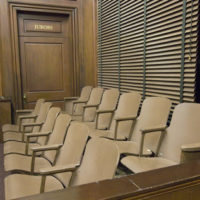What is Jury Misconduct, and How Can I Fight It?

If you were convicted of a crime that you did not commit, and if you believe that the jury had something to do with the verdict, you may file an appeal on the grounds of “jury misconduct.” Jury and juror misconduct does not occur often, but that does not mean that it does not occur ever. When a juror lies, or when one or more jurors disobey instructions, it can negatively affect the outcome of a person’s case, and land them in serious legal trouble. For many individuals, a dishonest jury can mean jail time, hefty fines, and a ruined future. If you believe that you were the victim of jury misconduct, do not hesitate, and reach out to the Miami appeals lawyers at The Baez Law Firm for a review of the original decision and the jury that made it.
When Jurors Lie
Juror misconduct can occur in many different ways, and can be committed by just one member or several. For instance, juror misconduct can occur in the initial juror selection stage, if one juror lied in response to a question during voir dire (their initial examination by the judge and/or counsel). Jurors are carefully and strategically selected in order to ensure the most fair trial for both parties. If even one juror lies, it can tip the balance in favor of either the plaintiff or defendant and result in an unfair trial.
Jurors may also commit misconduct by failing to obey jury instructions. During jury instructions, juries are commanded to consider only the evidence they hear in the courtroom when making their decision. However, some jurors may listen to the story on the news, or discuss the case with their spouse at home, and have their own opinion tainted by the opinions of others. To prevent this from happening, jurors are asked not to discuss the case with anyone, read about the case outside of the courtroom, or watch any news stories pertaining to the case. If they do, they are in violation of the rules given to them in their instructions. Jurors of high profile cases that receive a lot of media attention are sequestered in order to prevent both intentional and accidental juror misconduct.
Proving Juror Misconduct
Juror misconduct is not always obvious from the verdict. In fact, unless the jury’s verdict blatantly contradicts itself (such as in a personal injury case in which the jury determines the defendant is 100 percent liable, but then they decide that the plaintiff and defendant must split the damages 60/40), a wrongful verdict might go unnoticed if the defendant him or herself does not draw attention to it. Because of this, it is imperative that you hire a Miami appeals lawyer to review your case and help you appeal the decision right away.
If you suspect juror misconduct, our appeals lawyers will find evidence to support your claim. We will also use what juror testimony we can to shed light on what really happened during deliberations. (To learn more about juror testimony that is acceptable, review Rule 606 of the Federal Rules of Evidence.) If we hope to gain you a new trial based on juror misconduct, we must be able to prove not only that misconduct occurred, but also that the misconduct was prejudicial to your case—meaning that the misconduct was done to achieve a verdict that an honest jury would not have otherwise reached. While this can be difficult to prove, it is not impossible.
Consult a Miami Appeals Lawyer
At The Baez Law Firm, our Miami appeals lawyers will evaluate the circumstances surrounding your arrest, review the jury’s decision and how they came to a decision, and aggressively advocate for a new trial. To speak with one of our experienced lawyers today, call 800-588-BAEZ to schedule your free consultation.
Resource:
law.cornell.edu/rules/fre/rule_606




















